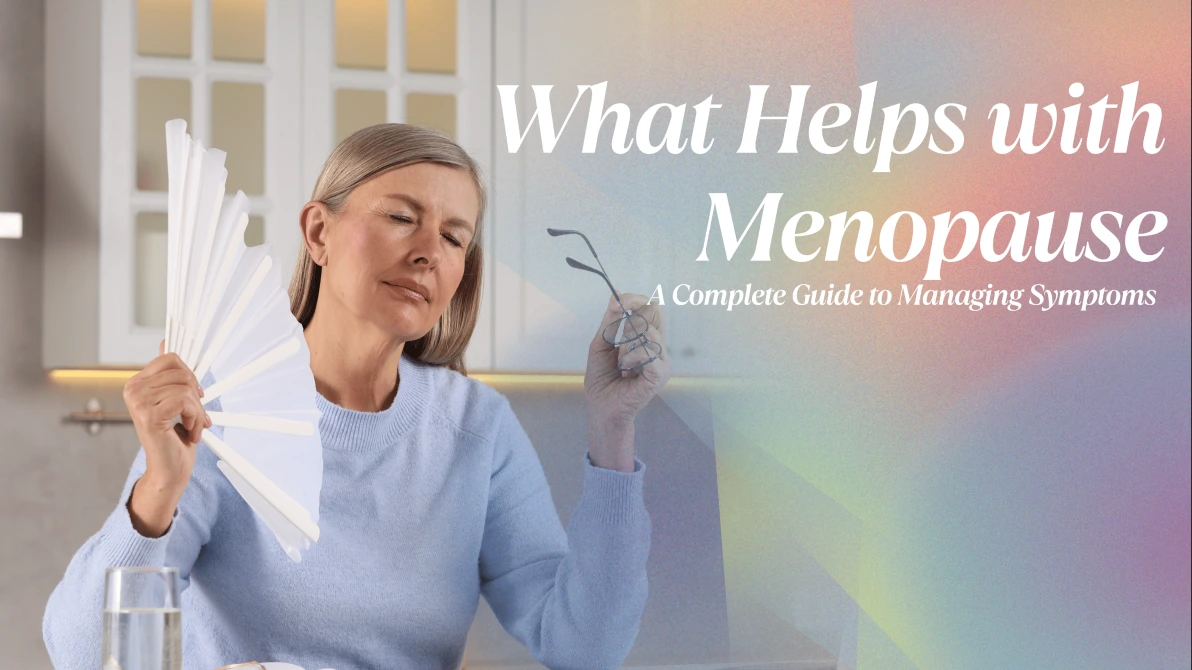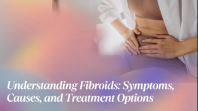What Helps with Menopause: A Complete Guide to Managing Symptoms
October 20, 2024

Menopause is a significant life transition that brings a range of physical and emotional changes. For many women, the question arises: What helps with menopause symptoms such as hot flushes, night sweats, and mood swings? In this article, we’ll explore effective strategies that can help ease menopause symptoms and promote a smoother transition into this new phase of life.
Understanding Menopause
Menopause typically occurs between the ages of 45 and 55 when a woman’s menstrual periods permanently stop. This natural transition is caused by the decline in the production of hormones, especially oestrogen. As hormone levels drop, women may experience symptoms like:
- Hot flushes (or flashes)
- Night sweats
- Mood swings
- Fatigue
- Vaginal dryness
- Weight gain
Finding relief from these symptoms is key to improving well-being. Let’s dive into what helps with menopause to manage these common challenges.
1. Lifestyle Changes
Adjusting daily habits can go a long way in managing menopause symptoms. Simple lifestyle changes can not only alleviate discomfort but also improve overall health during this transition.
Healthy Diet: A diet rich in fruits, vegetables, lean proteins, and whole grains helps balance hormones and reduces symptoms. Avoiding triggers like caffeine, alcohol, and spicy foods can also reduce the frequency of hot flushes.
Stay Hydrated: Drinking plenty of water is essential to counter the dryness and dehydration often caused by hormonal changes.
Exercise Regularly: Physical activity is one of the best ways to combat menopause symptoms. Aim for at least 30 minutes of moderate exercise a day. Exercise helps manage weight, improves mood, and can reduce the intensity of hot flushes and night sweats.
2. Hormone Replacement Therapy (HRT)
Hormone Replacement Therapy is a common solution for women wondering what helps with menopause symptoms such as hot flushes and vaginal dryness. HRT works by replenishing the oestrogen that the body is no longer producing. It is particularly effective in managing severe symptoms. However, there are potential risks, so it’s important to consult with a healthcare provider to understand the benefits and drawbacks of this treatment.
3. Non-Hormonal Medications
If HRT isn’t a suitable option, there are other non-hormonal medications that can help manage menopause symptoms:
- Selective Serotonin Reuptake Inhibitors (SSRIs): Often used to treat depression, SSRIs can also help reduce the frequency of hot flushes.
- Gabapentin: Originally developed to treat seizures, gabapentin has been shown to ease hot flushes, particularly night sweats.
- Clonidine: This medication, commonly used for high blood pressure, can also reduce hot flushes in some women.
4. Mind-Body Practices
When exploring what helps with menopause naturally, mind-body techniques are a safe and effective approach for managing stress and promoting emotional well-being. These practices help calm the nervous system and balance mood, reducing the severity of symptoms.
Yoga and Meditation: Yoga improves flexibility, reduces stress, and enhances mental clarity. Meditation and mindfulness can help women manage anxiety and mood swings, offering a sense of control over emotional symptoms.
Deep Breathing Exercises: Simple deep breathing techniques can reduce the frequency and intensity of hot flushes by calming the body’s stress response.
Acupuncture: Some women report that acupuncture helps with symptoms like hot flushes and insomnia. Although research is mixed, it may be worth exploring with a licensed practitioner.
5. Natural Remedies and Supplements
For those curious about what helps with menopause outside of medication, many women turn to natural remedies and supplements for relief. While some women find these options beneficial, it’s essential to consult a healthcare provider before trying any new supplements.
Black Cohosh: This herbal remedy is popular for managing hot flushes and night sweats. Though some women report success, its effectiveness varies, and you should discuss its use with a healthcare provider.
Phytoestrogens: Found in foods like soy, flaxseeds, and lentils, these plant-based estrogens mimic the effects of oestrogen in the body and can help balance hormone levels.
Calcium and Vitamin D: With the risk of osteoporosis rising during menopause, it’s essential to maintain bone health. Supplements of calcium and vitamin D can support bone density.
6. Emotional Well-being and Mental Health
Mood swings, anxiety, and feelings of depression can accompany menopause. Paying attention to mental health is just as important as managing physical symptoms.
Therapy or Counselling: Cognitive Behavioral Therapy (CBT) has been proven effective in treating mood disturbances during menopause. Therapy provides tools to cope with emotional changes and improve overall mental health.
Support Networks: Sharing your experiences with other women going through menopause can be incredibly supportive. Whether it’s talking with friends or joining a support group, knowing you’re not alone can make a big difference.
7. When to Seek Medical Advice
While lifestyle changes and natural remedies can help manage symptoms, it’s important to consult a healthcare provider if menopause symptoms are severely impacting your quality of life. A tailored treatment plan, whether through medication, therapy, or lifestyle adjustments, can significantly improve your well-being.
Conclusion
If you’ve been asking what helps with menopause, the answer lies in a combination of lifestyle changes, medical treatments, mind-body practices, and emotional support. By understanding your body’s needs and seeking appropriate solutions, you can navigate menopause with confidence and grace. Whether through diet, exercise, hormone therapy, or natural remedies, there are effective ways to manage this transition and feel your best during this new stage of life.



























